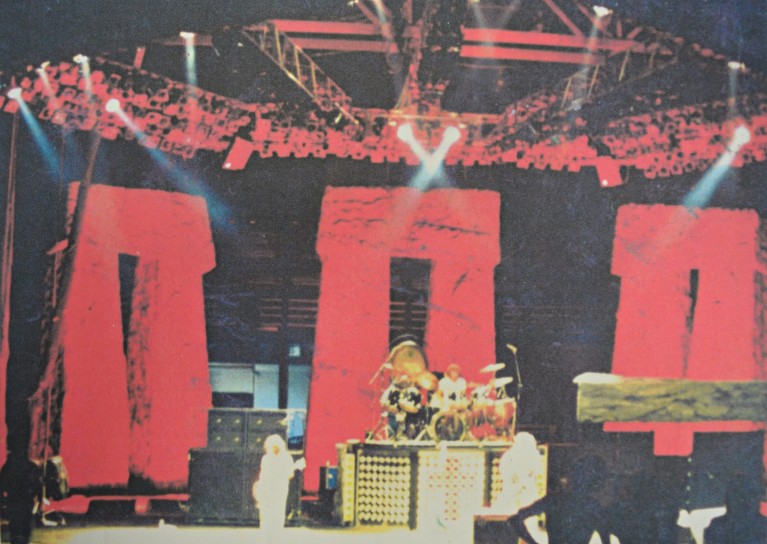
After a successful run with vocalist Ronnie James Dio, Black Sabbath faced the same problem they had three years prior. Not only was the band missing a singer, but Vinny Appice had also followed Dio to form his solo lineup.
This meant Tony Iommi and Geezer Butler had to regroup and put together a whole new band.
Oddly enough, Sharon Osbourne’s father (Don Arden) became their new manager while his daughter managed Ozzy Osbourne. He suggested Deep Purple front man Ian Gillan and it was completely out of nowhere. Neither band had ever shared a bill together besides the 1974 California Jam, but Gillan was not a member at the time.
Surprisingly enough, Robert Plant and David Coverdale were also considered.
Complete with Bill Ward making a return behind the drum kit, Sabbath was prepared to revive themselves yet again.
The album itself was consistent coming off of Mob Rules. It delivers the dark and heavy qualities expected from the fans even with the two ballads on the track list. Born Again also stands tall among the 70’s-era albums.
The main controversy surrounds Gillan’s vocal style within the Sabbath sound. It’s a make or break for some listeners, but it is undoubtedly a unique combination much like the Dio years. If you can get past the new sound that the band has gone through since the dawn of the 80’s, there’s plenty of great heavy metal for you to enjoy.
Producer Robin Black stepped in for the first time since 1975 during the production of Sabotage. The energy from that album is clearly represented in Born Again. Gillan’s screams are incomparable to anyone else.
Iommi also changed his guitar tone for the fourth time in this album. Adding this new feature exclusively for Born Again gave it its own identity while serving justice to the band’s name.
The opening track, Trashed, is a proper introduction to the new super group of 1983. Beginning with a howl from Gillan himself followed by the lines, “It really was a meeting! The bottle took a beating,” it sets in the intensity that drives the entire album.
The instrumentals have made a return only this time they’re darker than ever before. The dramatic atmosphere within Stonehenge is the perfect lead-in to one of Sabbath‘s eeriest songs in their catalog, Disturbing The Priest.
Opening with the haunting shrieks and laughter of Gillan, it’s only the start of the monstrous five minute track. The best part is when the song slows down in these calm, sinister sections that showcase Gillan’s vocal style syncing with the band’s sound. Accompanied by Ward’s thunderous drumming, it’s hard to argue that this song doesn’t suit the Sabbath name.
Fun fact: Disturbing The Priest was inspired by the album’s rehearsal studio being met with noise complaints from the local priests of a nearby church.
Not only does Born Again come through with badass vocals and shredding leads, but it does so in a very professional manner. Chopping up the lengthy songs with either short, straight ahead rockers or scary instrumentals allows the album to flow more comfortably without droning on too long.
The Dark sets the tone for a creepy and mysterious setting building up to the incredible epic, Zero The Hero. Armed with a menacing riff, this powerhouse never cools down for a second and contains one of Iommi’s best solos.
Another fun fact: Zero The Hero influenced the main riff in Paradise City according to Tracii Guns.
Digital Bitch and Hot Line are as in-your-face as it gets, consider them like Neon Knights and Turn Up The Night. It’s brutal heavy metal and a great departure to break up the ballads.
Now the ballads on the other hand…
It’s very interesting to see Sabbath dive into an emotional side to their songwriting. We’ve seen toned down songs from them in the past, however these are even more stripped down compared to the slower Dio-era tracks. These go back to the last few Ozzy records, Technical Ecstasy and Never Say Die, with a more melodic approach especially on Keep It Warm. The title track has grimier subject matter, however it also remains mellow all the way through similar to She’s Gone.
Keep It Warm, however, doesn’t have any of that traditional evil copyrighted by Sabbath. It’s a simple love story with one of the most lighthearted choruses in their career yet it still fails to disappoint. Most of the credit belongs to Gillan.
That’s where the heart of this album lies. His voice left a valuable imprint in the Sabbath saga. Even if the lyrics aren’t held to the same standard, Gillan carries it with his impressive range.
One of the other factors that drives people away from the album is the sound production. It’s the band’s worst mix by far and it happened after Gillan blew out the speakers by singing too loud.
But this only complimented Born Again with a more raw sound, making it more thematic overall.
Once the album was finished, Ward had another falling out which resulted in ELO drummer Bev Bevan touring with the band. This was the same tour where the infamous stonehenge Spinal Tap moment took place. During the 1983 tour, Sabbath used giant stonehenge props on stage. But one of the designers miscalculated Geezer Butler’s measurements for the prop and ended up with a life-sized stonehenge that couldn’t even fit through the back door of the venues.

Gillan, being the third vocalist for Sabbath, sang material from both eras of the band and did so efficiently along with live performances of Smoke On The Water.

Overall, Born Again was a total success. Not exactly reaching the monumental scale of Heaven And Hell or Mob Rules, but it certainly has a lot to offer for those willing to give it a chance.

Leave a Reply